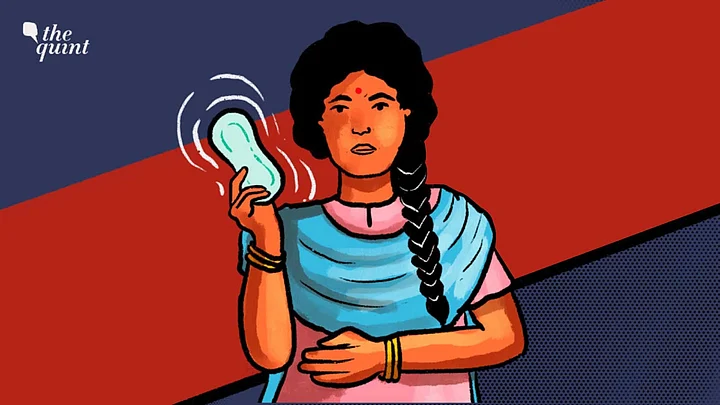“All silences are not equal, some seem quieter than others,” said Tom Stafford.
For decades, if not longer, menstruation in India was a secret every girl and every woman was supposed to keep within society, especially from men. Periods were the duration of the class, not the monthly cycle they went through. For their part, men were required to pretend not to have heard when the ‘P’ word was spoken.
Sanitary pads were available and affordable only for a few women, while the rest used improvised methods to manage their periods.
The disparity in access to menstrual hygiene products had far-reaching consequences, resulting in detrimental health outcomes for countless women.
Using improvised methods like rags or unsanitary materials posed significant health risks, while the associated shame and embarrassment took a toll on women’s emotional well-being. Coupled with societal taboos and restrictions, a pervasive culture of silence and stigma was created around menstruation.
Progress Was a Result of Years of Work
India seems to have come a long way in managing Menstrual Health Management (MHM) since. Between two NFHS surveys – four and five (in 2015-16 and 2019-21) – the use of a hygienic method for managing menstruation grew by an impressive 20 percent – from 57 percent to 77 percent.
This was the result of the efforts of girls and women, supported by social workers and NGOs, who challenged social norms that had kept issues like menstruation under lock and key. A women’s movement and expansion of the consumer industry have helped women find more affordable solutions, even as the use of sanitary pads has increased.
More recently, a young entrepreneur’s business plan on recycling used sanitary pads into usable goods found support in the popular television programme, Shark Tank, where he managed to get funds as well as an endorsement for his business plan.
An example of grassroots action is demonstrated by the initiative of girls in Bihar who established "sanitary napkin banks" through their own contributions, driven by their concerns surrounding menstrual hygiene management. This showcases the resilience and determination of women in navigating these challenges.
Currently, several big and small initiatives are helping women find hygienic sanitary pads that are also affordable and sustainable. Women’s self-help groups are evolving into a cottage industry where sanitary pads are being produced at a low cost.
However, such initiatives are not in place everywhere, making access to affordable pads sporadic. To take such initiatives to scale and help women in realising their rights, all men – whether bosses, fathers, brothers, teachers, colleagues, or others – need to be aware, supportive, and sensitive.
But One Cannot Ignore the Challenges
Despite the progress made, challenges persist. The psychological impact of menstruation remains unacknowledged. According to a study conducted in India, around 58% of girls reported facing physical problems during menstruation. However, a majority of them also reported psychological problems.
As many as 70 percent said they became irritable during periods, 78 percent reported they were restless, 63 percent had an unstable mood, and 58 percent felt stressed. The psychological impact of silence around menstruation is such that 65 percent of girls were not aware of menarche before the onset, while 10 percent did not have the privacy they needed to change sanitary pads, and a significant 32 percent faced restrictions during menarche.
This lack of support and understanding only adds insult to injury.
The economic implications of menstruation cannot be ignored. The lack of proper menstrual hygiene management facilities, including access to sanitary napkins and awareness of menstruation, leads to approximately 23 million girls dropping out of school annually, according to a report.
This educational setback restricts their future opportunities and hinders their ability to contribute to the economic development of society. By addressing these challenges, women can get empowered economically and play a more inclusive role in society.
In addition, cultural and religious factors play a significant role in perpetuating social taboos surrounding menstruation.
Addressing Barriers of Shame & Misinformation
Challenging these norms is as essential as providing sanitary pads to all girls and women. Comprehensive menstrual health education in schools and communities is much-needed and an unfinished agenda. The barriers of shame and misinformation will come crashing down when they are countered by information and education.
We must also consider the environmental impact of menstrual hygiene products. Disposable sanitary pads contribute to significant waste and environmental degradation. It is essential to explore and promote sustainable alternatives such as menstrual cups or reusable cloth pads.
This addresses both the accessibility and environmental aspects of menstrual hygiene management.
To drive change, strong policy and advocacy efforts are required. Governments should prioritise MHM and its link with health, well-being, gender equality, education, equity, empowerment, and women’s rights. It is crucial to recognise the intersectionality of the challenges faced by women regarding menstruation.
These challenges intersect with other social issues such as poverty, gender inequality, and access to healthcare. By addressing these interconnected factors, we can create a more inclusive and supportive environment for women to manage their menstruation with dignity and without hindrance.
For India to truly progress and for all its citizens to actively contribute to social and economic development, MHM must be recognized as a fundamental right and seamlessly integrated into everyday life.
It should be managed easily, supported with openness and compassion, rather than being a burden that causes women to miss school or remain confined to the margins of society.
(This article is jointly authored by public health expert Poonam Muttreja, Executive Director at Population Foundation of India, and Riya Thakur, Associate Lead for Youth and Adolescence at PFI. This is an opinion piece and the views expressed above are the authors' own. The Quint neither endorses nor is responsible for the same.)

